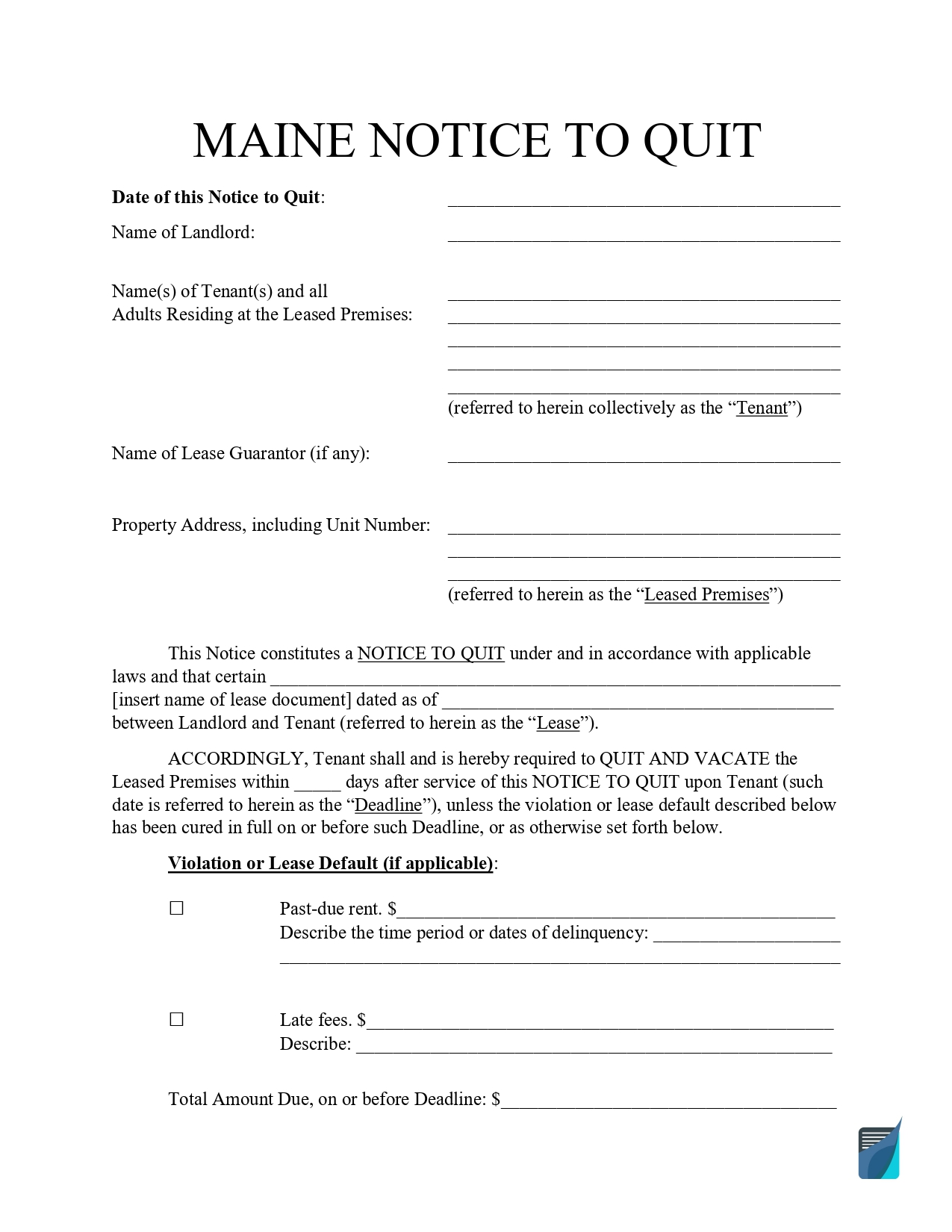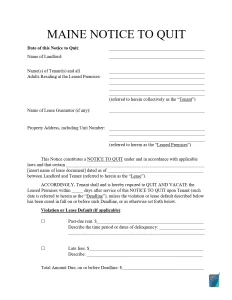Maine Eviction Notice Forms
The Maine eviction notice form is a legal document landlords must provide tenants to initiate the eviction process. This notice is a formal communication to inform tenants that they must either resolve a specific issue or vacate the premises by a given date. The reasons for issuing an eviction notice form in Maine include non-payment of rent, violation of lease terms, or other breaches specified in the rental agreement.
The eviction process must comply with Maine’s legal procedures. Landlords cannot forcibly remove tenants or their belongings from the property without a court order. If the matter goes to court, tenants have the right to present their case, and based on the circumstances of their eviction, they may also have defenses available to them.

Build Your Document
Answer a few simple questions to make your document in minutes
Save and Print
Save progress and finish on any device, download and print anytime
Sign and Use
Your valid, lawyer-approved document is ready
Maine Eviction Laws
Under Maine Revised Statutes, Section 6002, tenancies at will can be terminated by either party with a minimum of 30 days written notice, although exceptions apply under specific circumstances outlined in the statute.
Landlords must make at least three good-faith efforts to personally serve the eviction notice before resorting to mailing and leaving the notice at the tenant’s last known address and usual place of abode. Additionally, even after a notice is given, the acceptance of rent that accrues during the notice period does not affect the termination until a writ of possession is issued.
The Maine Revised Statutes permit landlords to issue a 7-day notice of termination under specific circumstances, necessitating affirmative proof of certain conditions:
- Substantial property damage. Caused by the tenant, their family, or guests.
- Creation of a nuisance. Actions that make the dwelling unfit for habitation or involve legal violations.
- Rent arrears. The tenant is more than 7 days late on rent payment.
- Criminal activity. Tenant’s involvement in domestic violence, sexual assault, or stalking.
- Unauthorized occupancy. A person residing who is not listed as a tenant.
Moreover, Section 6002 emphasizes that eviction notices must explicitly advise tenants of their right to contest the termination in court. Neglecting to include this advisory can impact the proceedings.
Maine Eviction Notice Laws Details
| Rent Grace Period | 15 days |
| Notice of Non-Payment | 7 days |
| Notice of Non-Compliance | 15 days |
| State Laws | Maine Revised Statutes, Title 14, Chapter 709 |
Eviction Notice Types Used in Maine
Maine law specifies several types of notices based on the eviction’s circumstances.
7-Day Notice for Cause
In Maine, a 7-day notice for cause is issued under serious circumstances, as detailed in §6002 of the Maine Revised Statutes. This includes substantial property damage, creating a nuisance, or any legal violation related to the tenancy. The landlord must provide concrete evidence of the tenant’s breach. If the notice is due to overdue rent, tenants can nullify it by settling their outstanding rent within the 7-day window.
7-Day Notice for Non-Payment
In Maine, landlords can issue a notice to quit for non-payment to inform tenants that they must pay the full amount of overdue rent within seven days. Failure to comply with this notice results in eviction proceedings. This is like a formal warning, giving tenants a limited timeframe to settle their debts and avoid further legal action.
30-Day No Cause Notice
This standard eviction notice allows either party to end the tenancy without stating a specific reason, provided a 30-day written notification is given. This is outlined under Section 6002 and applies unless waived in writing at the time the notice is given. It ensures flexibility within tenancies at will, granting landlords and tenants the right to terminate their agreement with proper notice.

Eviction Process in Maine
The eviction process in Maine is a structured legal procedure that protects the rights of both parties. Importantly, Maine law protects tenants from illegal evictions, such as utility shutoffs or landlord locking out without a court process, as outlined in Section 6014.
Issuance of Eviction Notice
The eviction process begins when a landlord issues a written notice to the tenant. This notice informs the tenant of a lease breach or the impending termination of the tenancy, typically providing 30 days to vacate the premises or rectify the issue. The landlord must make at least three attempts to deliver this notice personally. If direct delivery is unsuccessful, the notice can be sent via mail. The landlord must retain a copy of the notice and proof to support any subsequent legal actions.
Legal Filing for Eviction
Should the tenant fail to respond to the eviction notice appropriately, the landlord may escalate the matter by filing a legal complaint and summons. This step involves obtaining and completing the necessary forms (Form CV-007 for the complaint and Form CV-034 for the summons). This formal filing begins the court proceedings for eviction.
Service of Summons
Once the complaint and summons are filed, the landlord must provide these documents to the sheriff for official service on the tenant. This ensures that the tenant is formally notified of the legal action and has the opportunity to respond. If the sheriff cannot serve the tenant directly, the landlord must mail the summons and complete an Affidavit of Service (Form CV-204) to be filed with the court.
Court Hearing and Judgment
The eviction process culminates in a court hearing, where both parties can present their cases. If the tenant does not appear, the court may issue a default judgment in favor of the landlord. Following this, if the tenant still occupies the property, the landlord can request a Writ of Possession (Form CV-195) from the court. With this document in hand, the landlord is authorized to have the sheriff physically remove the tenant from the property.

Use our document builder to customize any template on FormsPal to your preferences. Here is a number of some other widely-used Maine forms we provide.
Other Eviction Notice Forms by State